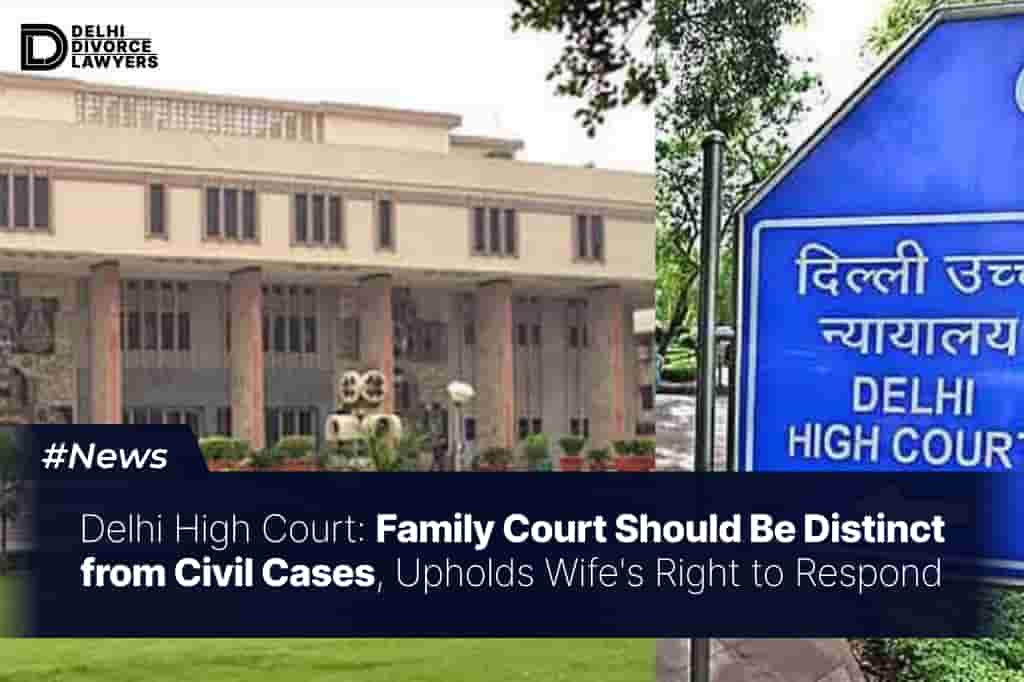The Delhi High Court was considering a Petition against an order of the Family Court whereby the Petitioner’s right to file reply/written statement was closed and a subsequent application for the recall of the said order was also dismissed.
The Delhi High Court has underscored that Family Courts must follow a fundamentally different approach from standard civil proceedings.
The Court was hearing a petition challenging a Family Court’s order that denied the petitioner the right to submit a reply or written statement and subsequently dismissed an application seeking a recall of that order.
The single-bench of Justice Ravinder Dudeja observed, “While dealing with disputes concerning the family, the Courts ought to adopt an approach radically different from that adopted in ordinary civil proceedings.”
Facts of the Case
The respondent filed a divorce petition under Section 13(1)(i-a) of the Hindu Marriage Act, 1955, against the petitioner before the Family Court. While the petitioner was initially proceeded against ex-parte, this order was later set aside upon payment of costs. The Family Court then granted her two weeks to file a reply or written statement but later closed her right to do so. When the petitioner sought to have this order set aside, her application was dismissed through the impugned order.
The petitioner’s counsel argued that she is a single mother solely responsible for raising and caring for two children, including a minor son, and is facing financial hardship due to the ongoing legal battle initiated by the respondent. It was further submitted that her daughter has been undergoing medical treatment since July 2024, requiring multiple consultations, diagnostic tests, and continuous medical supervision. However, the Family Court failed to consider the medical records substantiating this claim. Additionally, the counsel contended that the respondent was aware of his daughter’s medical condition, as evidenced by a WhatsApp conversation between him and his daughter, which has been placed on record. Emphasizing that the delay in filing the written statement was neither intentional nor deliberate but caused by these compelling circumstances, the counsel stated that the written statement is now ready and sought a single opportunity to submit it.
Conversely, the respondent’s counsel argued that photographs shared by the daughter on WhatsApp suggest she was on a leisure trip with family and did not appear to be suffering from any serious ailment that would have prevented the petitioner from filing the written statement within the given timeframe. It was further contended that, despite the divorce petition being filed in August 2023, no progress has been made due to the petitioner’s deliberate attempts to delay the proceedings. The counsel maintained that the impugned orders passed by the Family Court are neither illegal nor perverse and, therefore, the petition should be dismissed.
Reasoning By Court
At the outset, the Court emphasized that Family Courts must adopt a fundamentally different approach from traditional civil proceedings.
It referred to its judgments in Komal Gupta v. Amrendra Kumar Gupta and Dr. Sunil Kumar v. Dr. Archana, where delayed written statements were allowed to be taken on record.
The Court further noted that the petitioner’s daughter is experiencing health issues, as indicated by WhatsApp conversations demonstrating the respondent’s awareness of her condition.
“The closure of petitioner’s right to file the written statement would deprive her of an opportunity to defend herself in the divorce petition. Petitioner shall suffer great prejudice in case she is not allowed to file the written statement and bring-forth her defence in the divorce petition,” the Court observed.
Accordingly, the petition was allowed.

